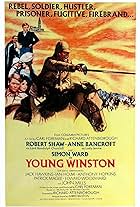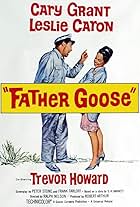evanston_dad
Se unió el ene 2005
Te damos la bienvenida a el nuevo perfil
Seguimos trabajando en la actualización de algunas funciones del perfil. Para ver los distintivos, los desgloses de las calificaciones y las encuestas para este perfil ve a versión anterior .
Calificaciones3,4 mil
Calificación de evanston_dad
Comentarios3,4 mil
Calificación de evanston_dad
"Boom Town" starts out strong and promises to be a fun and funny yarn about oil wildcats capitalizing on the mega screen presence and off the charts chemistry of Clark Gable and Spencer Tracy. But once Claudette Colbert enters the picture, the story becomes a somewhat tedious and repetitive rivalry driven by the two mens' love of the same woman. One goes bust while the other one strikes it big. Then they switch roles. And then they switch again. And it feels like this goes on ad nauseum.
The film ends in a pretty gross place, with Gable telling Colbert that she belongs to him and he'll knock some sense into her if she doesn't admit it, after which she swoons into his arms. What woman could resist such a charming guy?
I liked "Boom Town" when it was focused on the oil business and was kind of bored by it when it was focused on the various love affairs. I liked any scene that Frank Morgan was in. His dithering is always funny, and he gets to showcase some of his physical comedy skills as well.
"Boom Town" was nominated for two Oscars in 1940, Best B&W Cinematography and Best Special Effects for a segment where an oil field goes up in flames. There were 14 nominees in that particular category in 1940!!
Grade: B.
The film ends in a pretty gross place, with Gable telling Colbert that she belongs to him and he'll knock some sense into her if she doesn't admit it, after which she swoons into his arms. What woman could resist such a charming guy?
I liked "Boom Town" when it was focused on the oil business and was kind of bored by it when it was focused on the various love affairs. I liked any scene that Frank Morgan was in. His dithering is always funny, and he gets to showcase some of his physical comedy skills as well.
"Boom Town" was nominated for two Oscars in 1940, Best B&W Cinematography and Best Special Effects for a segment where an oil field goes up in flames. There were 14 nominees in that particular category in 1940!!
Grade: B.
This is one of those "did I see the same movie everyone else did?" scenarios.
When I go to the Internet to see what viewers have said about "Morocco," I see rapturous reviews lauding the film's ambience and surrealism, its romantic depth and its deep ruminations about love and faith. To all which I say, "huh?" What I watched was a sluggishly paced, paper thin story featuring two leads who seemed bored to be in the movie. Is it heresy for me to suggest that Marlene Dietrich isn't a very good actress? She's a beauty, and she had an exotic appeal that was unique to audiences at the time, so I don't begrudge her her fame. But a love story as simplistic as this needs really good actors to sell it, and she doesn't. We're just told she and Gary Cooper are desperately in love with each other, but we're never shown it.
And I don't know what on earth people are talking about when they say director Josef von Sternberg creates a surrealistic dreamscape. This film always felt very rooted in real settings. I would probably have liked it more had it leaned into surrealism or the kind of German expressionism that von Sternberg brought to other films.
The last shot is a doozy, I'll give the movie that much. It alone probably elevates my personal rating by at least one star.
I know this was an early sound film and that I need to cut it some slack in some of the areas that we now have higher standards for. And that defense might work for me if I hadn't seen a bunch of other films from the same time period that actually have the qualities "Morocco" is credited with having but doesn't.
I think people are overly kind to this movie now because of that iconic tuxedo number Dietrich performs and that has developed its own cult following.
Nominated for four Academy Awards in the 1930-31 award year: Best Director, Best Actress (the only one of Dietrich's career), Best Art Direction, and Best Cinematography (again, see that last shot).
Grade: C+
When I go to the Internet to see what viewers have said about "Morocco," I see rapturous reviews lauding the film's ambience and surrealism, its romantic depth and its deep ruminations about love and faith. To all which I say, "huh?" What I watched was a sluggishly paced, paper thin story featuring two leads who seemed bored to be in the movie. Is it heresy for me to suggest that Marlene Dietrich isn't a very good actress? She's a beauty, and she had an exotic appeal that was unique to audiences at the time, so I don't begrudge her her fame. But a love story as simplistic as this needs really good actors to sell it, and she doesn't. We're just told she and Gary Cooper are desperately in love with each other, but we're never shown it.
And I don't know what on earth people are talking about when they say director Josef von Sternberg creates a surrealistic dreamscape. This film always felt very rooted in real settings. I would probably have liked it more had it leaned into surrealism or the kind of German expressionism that von Sternberg brought to other films.
The last shot is a doozy, I'll give the movie that much. It alone probably elevates my personal rating by at least one star.
I know this was an early sound film and that I need to cut it some slack in some of the areas that we now have higher standards for. And that defense might work for me if I hadn't seen a bunch of other films from the same time period that actually have the qualities "Morocco" is credited with having but doesn't.
I think people are overly kind to this movie now because of that iconic tuxedo number Dietrich performs and that has developed its own cult following.
Nominated for four Academy Awards in the 1930-31 award year: Best Director, Best Actress (the only one of Dietrich's career), Best Art Direction, and Best Cinematography (again, see that last shot).
Grade: C+
Back around the year 2000, the Modern Library of America released a list of the greatest 100 novels of the 20th century. I made it a project to read the entire list, which led me to "Ironweed" by William Kennedy, a novel I'd never heard of. It took my breath away and to this day remains one of the best books I've ever read.
The film version boasts two really great performances by Jack Nicholson and Meryl Streep, and some touching sequences, notably one in which Streep sings for a barroom full of people and we see fantasy collide with reality, and another when Nicholson's character returns to visit the family he walked out on twenty years ago. But overall the movie remains relentlessly bleak and rather pointless in a way the book didn't. I kept asking myself during the movie, "why am I being subjected to all of this misery?", which is a question I never asked myself while reading the book. And the movie never answers that question.
I liked the look of the film. It's bathed in sepia tones that makes it look like the pictures you've seen of the Great Depression. It's even rather beautiful in a way, which is really saying something given the grungy, depressing world in which it's set. But I'd never want to watch this again.
Both Nicholson and Streep were nominated for lead acting Oscars in the year of this film's release.
Grade: B+
The film version boasts two really great performances by Jack Nicholson and Meryl Streep, and some touching sequences, notably one in which Streep sings for a barroom full of people and we see fantasy collide with reality, and another when Nicholson's character returns to visit the family he walked out on twenty years ago. But overall the movie remains relentlessly bleak and rather pointless in a way the book didn't. I kept asking myself during the movie, "why am I being subjected to all of this misery?", which is a question I never asked myself while reading the book. And the movie never answers that question.
I liked the look of the film. It's bathed in sepia tones that makes it look like the pictures you've seen of the Great Depression. It's even rather beautiful in a way, which is really saying something given the grungy, depressing world in which it's set. But I'd never want to watch this again.
Both Nicholson and Streep were nominated for lead acting Oscars in the year of this film's release.
Grade: B+




























